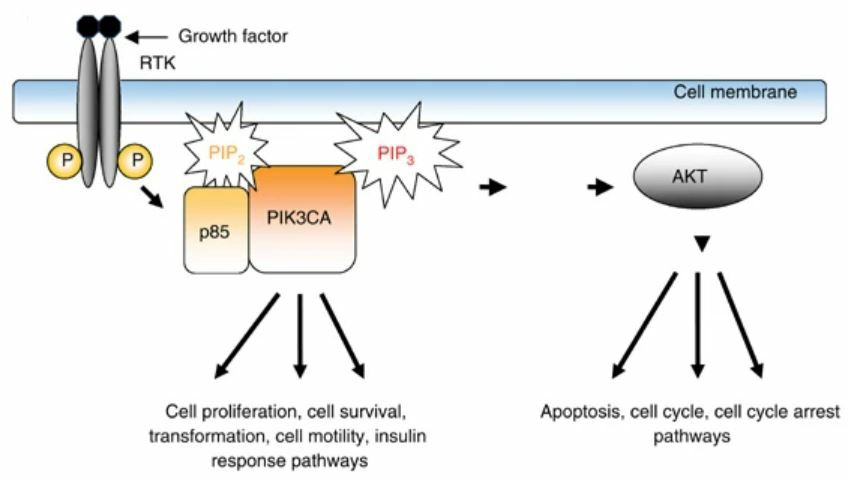PIK3CA and Associated Diseases
As an expert in the field of gene therapy, Creative Biolabs is committed to the development of gene therapy in the future, contributing long-term experience and state-of-the-art analytical techniques for tailor-made solutions. We are always willing to share cutting-edge technology and information in this field, including information about phosphatidylinositol-4,5-bisphosphate 3-kinase catalytic subunit alpha (PIK3CA) gene.
Overview of PIK3CA
PIK3CA is a protein-coding gene that encodes the p110 α protein as the catalytic subunit of phosphatidylinositol 3-kinase (PI3K). PI3K consists of two subunits, catalytic subunit p110α responsible for carrying out the actions of PI3K while the regulatory subunit is responsible for regulating the activity of the enzyme. Like other kinases, PI3K phosphorylates certain signaling molecules to trigger a series of reactions that transmit chemical signals in cells. PI3K signaling is a critical regulator of many cellular events, including the transport of intracellular materials, cell proliferation, cell migration, and cell survival. Additionally, PI3K signaling may be involved in the regulation of multiple hormones as well as adipocyte maturation.
Diseases Related to PIK3CA Genetic Changes
- Epidermal nevus
Alterations in the PIK3CA gene are found in people with a certain type of epidermal nevus. Mutations in the PIK3CA gene contribute to some keratinocyte epidermal nevus, which are abnormal skin growths made up of skin cells called keratinocytes. In epidermal nevus, the PIK3CA gene mutation changes an amino acid in the p110α protein, which causes cells to grow and divide more than normal to form an epidermal nevus.
- PIK3CA and cancers
Somatic mutations in the PIK3CA gene are present in some bladder cancer cases. In bladder cancer, certain cells become abnormal and multiply uncontrollably in the bladder tissue. It is often accompanied by features including blood in the urine, painful urination, and frequent urination. The PIK3CA abnormality changes a single amino acid in the p110α protein, which may contribute to PI3K becoming hyperactive. Increased PI3K signaling may lead to uncontrolled cell proliferation and the development of bladder cancer. Furthermore, somatic mutations in the PIK3CA gene have also been found in many other types of cancer, including breast, ovarian, brain, lung, colorectal, and gastric cancers. Deregulation of the PIK3CA gene in cancers provides new insights into its mechanistic link to cancer development.
 Fig.1 The main reaction catalysed by PI3K. (Karakas, 2006)
Fig.1 The main reaction catalysed by PI3K. (Karakas, 2006)
PIK3CA Related Pathways in Cancers
Mutations in the PIK3CA gene have a crucial impact on the efficacy and prognosis of cancer, and thus these mutations are of great clinical importance for many solid malignancies. These genetic changes result in altered kinase activity of the PI3K pathway. PIK3CA is an important component of PIKs, a group of lipid kinases that serve as important upstream activators of various important signaling pathways. Hyperactivation of the PI3K/ protein kinase B (AKT)/ mammalian target of the rapamycin (mTOR) pathway confers dysregulation of cell growth and differentiation which is critical for the development and progression of several solid tumors.
With the cutting-edge technology platform and dedicated scientists, Creative Biolabs is confident in providing high-quality gene therapy-related services to meet your unique needs. With the increasing recognition of our services by customers, Creative Biolabs has become a world-renowned biological brand. If you are interested in our gene therapy service, please contact us for more details.
Reference
- Karakas, B.; et al. Mutation of the PIK3CA oncogene in human cancers. British journal of cancer. 2006, 94(4): 455-459. Distributed under Open Access license CC BY-SA 3.0, without modification.
